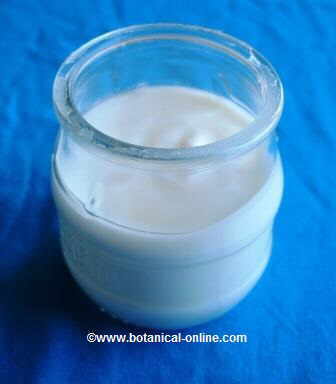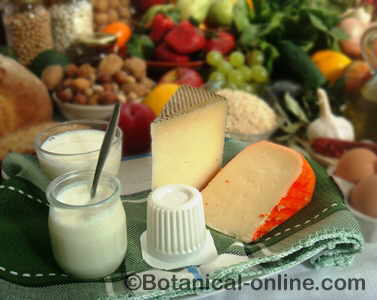Contents
REDUCE THE CONSUMPTION OF YOGURT
When should yogurt consumption be controlled?
Due to its sugar and/or fat content, in cases in where it is suffered, for example:
- Obesity: To reduce calorie intake, it is advisable to use skimmed or semi-skimmed yogurts, free of sugars or artificial caloric sweeteners.
- Advanced renal failure: It may be necessary, in ambulatory hemodialysis and peritoneal dialysis, to control the intake of phosphorus, protein and calcium. Calcium ingestion through dairy products will be controlled based on protein restriction.
- Hyperlipoproteinemia and cardiovascular disorders: Depending on the type of hyperlipoproteinism, the indications are different. Yogurts that come from natural milk are rich in saturated fat and cholesterol, so they are not recommended in people with cardiovascular diseases. In the case of arteriosclerosis and embolisms, it is recommended to consume skimmed yoghurts.
- Hypertriglyceridemia and hyperlipidaemia: In case of high triglycerides or lipids in the blood, skimmed yogurt without added sugar should be consumed.
- Hypercholesterolemia: In case of high “bad cholesterol”, yogurts free of cholesterol, skimmed or semi-skimmed and with low fat will be consumed. The functions will be more or less severe depending on the individual weight and cholesterol level.
When not to eat yogurt?
Depending on the different diseases and each person, the recommendations may vary. Even so, there are diseases in which the consumption of yogurt or any derived lactic acid should be totally avoided.
This is the case of:
 Galactosemia: hereditary disease in which an enzyme necessary to metabolize galactose is missing. Galactose is a monosaccharide that is part of the lactose contained in milk (either human or animal). As yogurt has less lactose but is not completely lactose absent, its consumption is not recommended. If this disease is not properly treated, the accumulation of galactose in the body could lead to damage to the liver, the central nervous system, kidney failure, mental and growth retardation, and cataracts.
Galactosemia: hereditary disease in which an enzyme necessary to metabolize galactose is missing. Galactose is a monosaccharide that is part of the lactose contained in milk (either human or animal). As yogurt has less lactose but is not completely lactose absent, its consumption is not recommended. If this disease is not properly treated, the accumulation of galactose in the body could lead to damage to the liver, the central nervous system, kidney failure, mental and growth retardation, and cataracts.- Allergy to cow’s milk: it is the immune response to milk protein. As yogurt is a derivative produced with milk, its consumption will not be recommended either because it will have the same effect as its raw material. The proteins that most cause this problem are casein, α-lactalbumin, and β-lactoglobulin.
Many studies show that 2-5% of children are born with a milk allergy and that 80% of them stop having an allergy when they are 5-6 years old. The main symptoms are: inflammation of the lips, tongue, face or throat, itchy skin and eyes and respiratory problems. In rare cases, anaphylaxis may develop, which is a very serious type of whole-body allergic reaction that can even lead to death.
- Lactose intolerance: it is the inability to digest lactose, the predominant sugar in milk. It is due to the lack of the enzyme lactase, produced in the intestine. It can be primary or genetic and therefore incurable, or secondary, which is the most common, and is caused by intestinal problems caused by viruses, bacteria, parasites or malnutrition.
The latter case is reversible and therefore the tolerance level should be controlled. That is, it may not tolerate milk but it can tolerate food products with less lactose such as yogurts, due to their content of lactic acid bacteria that contain lactase (an enzyme that digests lactose). In any case, they can take “vegetable milks” or milk without lactose.
- Celiac disease: it is gluten intolerance, although they usually have lactose intolerance, so they would be included in those that do not recommend the consumption of yogurt.
- Stomach or intestinal surgery: in these cases the progressive introduction of yogurt is recommended due to its easy digestion, high tolerance and repopulating effect of the intestinal flora that has been diminished by the operation. Yogurt can be introduced after a time of healing of the operation and once the curd has been tolerated.
- Heartburn or gastritis: in case of heartburn, it is not recommended to take yogurt since it is considered an acidifying food and therefore counterproductive.
![]() More information on milk and milk products
More information on milk and milk products

 Galactosemia: hereditary disease in which an enzyme necessary to metabolize galactose is missing. Galactose is a monosaccharide that is part of the lactose contained in milk (either human or animal). As yogurt has less lactose but is not completely lactose absent, its consumption is not recommended. If this disease is not properly treated, the accumulation of galactose in the body could lead to damage to the
Galactosemia: hereditary disease in which an enzyme necessary to metabolize galactose is missing. Galactose is a monosaccharide that is part of the lactose contained in milk (either human or animal). As yogurt has less lactose but is not completely lactose absent, its consumption is not recommended. If this disease is not properly treated, the accumulation of galactose in the body could lead to damage to the 






